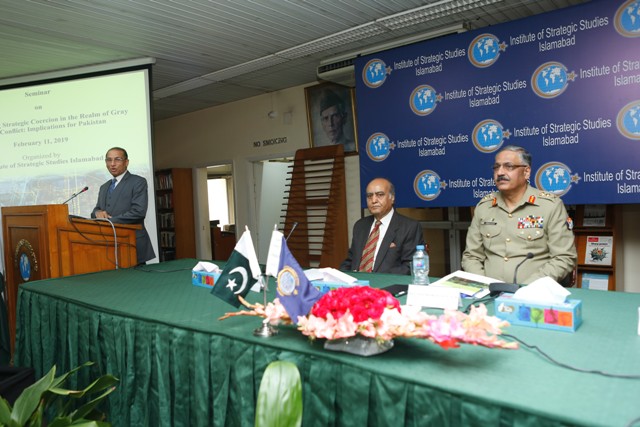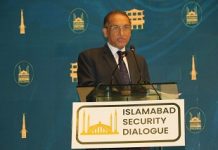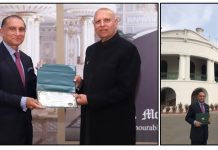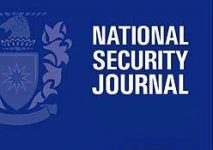Seminar
Strategic Coercion in the realm of gray hybrid waR
11 February, 2018
Remarks of the Director General
General Zubair Mahmood Hayat, honorable Chairman of the Joint Chiefs of Staff Committee,
Respected speakers at the Seminar, Worthy guests, Ladies and Gentlemen,
May I extend to you all, a warm welcome to the Institute of Strategic Studies.
The subject of this seminar is of topical significance and increasingly relevant to the prevailing environment in and around Pakistan.
We are fortunate that a very capable and experienced person is our chief guest today. Everyone knows that General Zubair Mahmood Hayat is Chairman of the Joint Chiefs of Staff Committee. Increasingly, people are discovering that besides being a highly competent General of Pakistan Army, there is a profound intellectual dimension of his personality, which we are fortunate to benefit from today.
I have interacted with General Zubair in his last three capacities: As Director General of SPD, he had full grasp of the import and direction of our strategic plans. As Chief of General Staff, and in his present capacity as Chairman Joint Chiefs, I have had the good fortune of benefitting from his deep insights.
General Zubair is an authority on the subject of this seminar. In fact, on all issues of strategic significance for Pakistan, he comes across as a clear-headed officer with deep understanding of the trends shaping up the world and our region.
Thank you General for accepting our invitation to inaugurate this important seminar.
May I also thank our three learned speakers, whom we would listen after the inaugural session:
Mr Leonid — is a well known scholar on this subject and has specially flown in from Russia for this seminar.
Mr Ikram Sehgal not only runs a successful business enterprise, but also has astute intellect, which he has amply displayed, through the books and articles he has authored, meetings that he hosts in World Economic Forum in Davos, and through the platform of Karachi Council on Foreign Relations, which is now working closely with our Institute.
General Khalid Naeem Lodhi also brings to this forum a wealth of experience on war and peace issues.
Gentlemen, thank you for accepting to share your thoughts today.
Ladies and Gentlemen, you have all seen the concept note we have circulated. You would note that the conflict of interest is as old as human society. It manifests itself through kinetic and non-kinetic ways. While war has been a constant in human history, the way wars are fought has evolved over time.
We have all heard of the four generations of the modern warfare. It is the fourth generation of war, a term coined as late as 1989, that explains how the scope and modes of war have expanded way beyond the conventional warfare. A more recent term, hybrid warfare, has emerged that blends conventional, unconventional, cyber, and psychological warfare, media manipulation, cultural invasions, and relentless propaganda to create ambiguity and confusion about the core values that hold a society or nation together.
When we look around, all this seems familiar.
My first question to the panelists, therefore, is whether the hybrid war imposed on us by hostile forces real or is it a figment of our imagination? My own take. It is as real as our presence in this hall today.
Since 9/11, we remained embroiled in a disastrous war against terrorism. We managed to reverse the tide of terrorism, though at a staggering human and financial cost. Very few nations have done what we did.
However, not everyone is happy about our accomplishments. I remember in 2016 two countries in our neighborhood launched a concerted campaign to isolate Pakistan. They demonized Pakistan and unleashed relentless propaganda and psychological warfare against us. Pakistan despite all challenges remains ever strong and determined to protect our sovereignty, our national interests, and our core values. But we must not be complacent.
My second question is why should anyone target Pakistan? Is it because of our own follies? Is it our geography? Or Is it our refusal to take dictation from regional and global powers?
Again my take on this is as follows. The world has become so much more complex. So has our region. Almost perennially hostile India, unstable frontier in our West, and a roller coaster relationship with the US. The US Asia pivot, partnership with India, and strategic competition with China has added complexity to our region. Even projects of connectivity, such as BRI and CPEC, are being viewed by these forces negatively. Pakistan has two choices, either accept what is being presented to us by the global and regional powers or stick it out?
My third question would be what kind of hybrid warfare are we confronted with?
Keeping our borders hot? Dissident groups? Social media activists? Foreign NGOs with their own agendas? Education institutions? Ideological confusion through media and social media? All of the above, I suppose, and more. We need to be aware of that. Our nation needs to be aware. Only then the hostile agendas can be defeated.
My final question is what is it that we can do to effectively counter this hybrid warfare?
I am confident that we all would like to benefit from the wisdom and thoughts of the Chairman and the panel of speakers on all these aspects of today’s theme.
With these words, I once again welcome you all, and especially General Zubair, whom I now invite to address us on this important question. Thank you.












